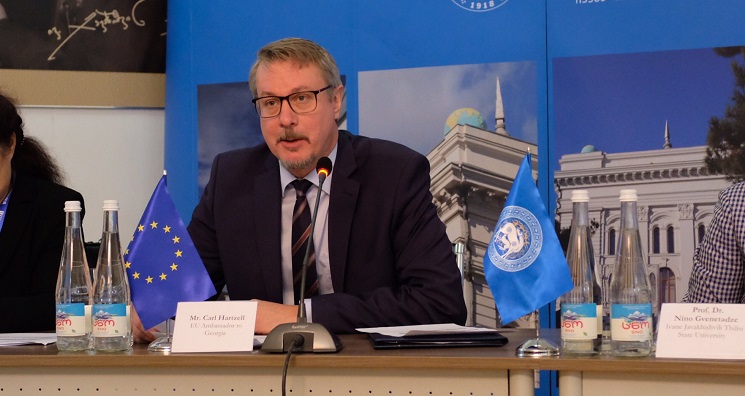Several ruling party MPs collecting signatures for bill on fully majoritarian elections

Several of the ruling party’s majoritarian MPs say that a fully proportional electoral system, which is scheduled to be launched in Georgia from 2024, is not for Georgia.Photo: parliament of Georgia press office.
Eleven majoritarian MPs of the ruling Georgian Dream (GD) party, who rejected the party proposed bill on an early transition to a fully proportional elections on November 14, are set to collect 200,000 signatures from voters to initiate a bill to parliament on the transition to a fully majoritarian elections from 2024.
The move comes amid protests in the country, sparked by the rejection of the GD-proposed bill last month which should have ensured the transition to a fully proportional electoral system starting from 2020 instead of 2024 [as the current Georgian constitution reads].
The majoritarian MPs of the ruling party say that the country should have a two-chambered parliament: a lower chamber named the Council of the Republic and the upper chamber – the Senate, with all the 150 MPs elected in single-mandate constituencies.
 Ruling patty majoritarian MP Dimitri Khundadze voiced the initiative about the new bill in mid-November. Photo: parliament press office.
Ruling patty majoritarian MP Dimitri Khundadze voiced the initiative about the new bill in mid-November. Photo: parliament press office.
They say that the Council of the Republic will be elected for a four-year-term and will be composed of 77 MPs, while the Senate will be elected for a five-year-term and will be composed of 73 MPs.
The citizens of Georgia over 25 will be allowed to be elected to the lower chamber, while senators must be over 40.
Senators will represent one or several municipalities, except Tbilisi.
Leader of the ruling party Mamuka Mdinaradze has stated earlier today that the bill on the transition to a fully majoritarian electoral system will not gain support in parliament.
Currently Georgia has a mixed electoral system, with 73 MPs elected in single-mandate constituencies [majoritarian elections] and remaining 77 based on proportional, party-list system.
After the rejection of election bill last month, the system is likely to be maintained for 2020 elections, while the opposition is demanding the German electoral model for 2020 race, which is also mixed, but distributes seats in the legislative body based on the votes received in the proportional voting.
 Tweet
Tweet  Share
Share






